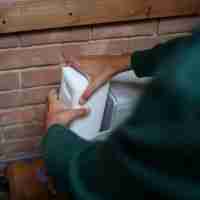How To Keep Basement Dry Without Dehumidifier?
How to keep basement dry without dehumidifier? A humid basement is a common problem among homeowners. If you try to eradicate moisture with conventional methods, the humidity will eventually come back.
Professionals recommend using a dehumidifier to eliminate excess water in the basement; however, purchasing one can be costly.
Here we’ll provide an alternative to buying a dehumidifier and will instead discuss how to keep your basement free of excessive moisture without having to spend extra money.
How To Keep Basement Dry Without Dehumidifier?

Instead of using a dehumidifier to help eliminate the excess moisture, you can use plants, desiccants such as borax or silica gel, and open windows.
However, the best way to make sure moisture doesn’t accumulate is to find the source of sweat and correct it by fixing a leak or turning down the heat so that there’s no noticeable dampness.
1. Open windows
This system always springs to people’s minds when dealing with moisture problems in their homes.
However, it is not a foolproof method of dealing with humidity because it can cause the surroundings to get even more humid if not done properly or if the outside air is too dry or cannot handle any excess moisture.’
So you’re just adding on to what you have already. If the air outside is dry, open some windows because that allows for ventilation and helps regulate humidity levels inside your home.
Which may have gotten out of hand during muggy summer days, for example. However, if the air outside happens to be damp, you’re making things worse. That is why we recommend installing a dehumidifier.
2. Use of Desiccant
Desiccants are substances that remove moisture from the air around them.
They’re often sold in the form of crystal packs to be used in storage containers; you could also instead place a handful of uncooked rice inside your packaging box, as it’s cheaper and just as effective.
3. Use of Moisture Absorbent Plants
Not all plants are created equal, and just like the ideal employee, someone with exceptional traits is worth their weight in gold.
Some plants absorb moisture while others do not. If you’re having trouble keeping your office looking sharp, it might be a good idea to invest in an air-purifying plant.
Plants like bamboo palms or computer plants are great for cleaning the air since they digest everything from nicotine to chemicals!
These low-maintenance houseplants will give your secretary a warm fuzzy feeling inside when she walks into the office each day, knowing that she works for such a green company.
Causes of Humidity in Basement
The main causes of humidity in the basement are given below:
1. Bathroom on Basement
The bathroom could be the cause of your problems. A cracked tile or two could be letting water seep through. That’s how long-term moisture buildup occurs in the basement ceiling crevices.
Which presents as condensation that’s easy enough to spot. But there are also signs to look out for before symptoms appear.
Wax rings on cracks in the tub or toilet can put a damper on the bathroom performance and possibly lead to such moisture buildup issues.
2. Plants in Basement
If you were wondering, no, plants don’t grow well in basements. Though they may have the light they need through a basement window thanks to natural daylight.
They will suffer from excess moisture likely hanging around due to an insufficient vent system. Of course, one or two plants might seem like a cop-out concern.
Still, suppose you’re looking to start your collection of flora. In that case, it’s best to avoid beginning it in your basement.
As you may regret creating such a humid environment down there later on if your basement isn’t properly equipped and prepared for storage or cultivation features.
3. Humid Air
In hot, humid weather areas with a shortage of humidity, it can be not easy to keep the basement dry without a dehumidifier.
However, to try and keep pesky moisture at bay throughout your home, you might also want to consider installing one in every room on the lower levels especially.
There’s no better way to ensure that warm, humid air meets with cold air in our homes than by setting up an AC system throughout every room to prevent unwanted dampness from destroying furniture, ruining belongings and encouraging dangerous mould to flourish!
It’s crucial in these parts of the world for homes to have systems designed specifically for dehumidifiers so as not to affect overall everyday comfort levels during what are often sweltering months for many who live here permanently or vacation here year-round.
Related Posts




